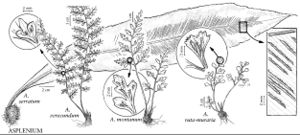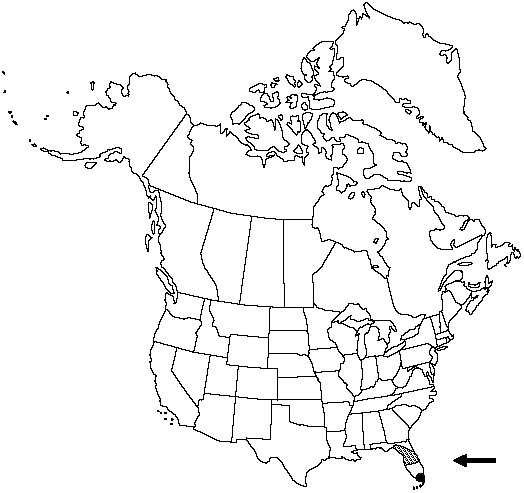Difference between revisions of "Asplenium verecundum"
Bull. Torrey Bot. Club 33: 193. 1906.
FNA>Volume Importer |
imported>Volume Importer |
||
| (7 intermediate revisions by 2 users not shown) | |||
| Line 6: | Line 6: | ||
|place=33: 193. 1906 | |place=33: 193. 1906 | ||
|year=1906 | |year=1906 | ||
| + | }} | ||
| + | |special_status={{Treatment/ID/Special_status | ||
| + | |code=F | ||
| + | |label=Illustrated | ||
| + | }}{{Treatment/ID/Special_status | ||
| + | |code=E | ||
| + | |label=Endemic | ||
}} | }} | ||
|basionyms= | |basionyms= | ||
| Line 11: | Line 18: | ||
|name=Asplenium scalifolium | |name=Asplenium scalifolium | ||
|authority=E. P. St. John | |authority=E. P. St. John | ||
| − | }}{{Treatment/ID/Synonym | + | |rank=species |
| + | }} {{Treatment/ID/Synonym | ||
|name=Asplenium suare | |name=Asplenium suare | ||
|authority=E. P. St. John | |authority=E. P. St. John | ||
| − | }}{{Treatment/ID/Synonym | + | |rank=species |
| + | }} {{Treatment/ID/Synonym | ||
|name=Asplenium subtile | |name=Asplenium subtile | ||
|authority=E. P. St. John. | |authority=E. P. St. John. | ||
| + | |rank=species | ||
}} | }} | ||
|hierarchy=Aspleniaceae;Asplenium;Asplenium verecundum | |hierarchy=Aspleniaceae;Asplenium;Asplenium verecundum | ||
| Line 25: | Line 35: | ||
}}<!-- | }}<!-- | ||
| − | --><span class="statement" id="st- | + | --><span class="statement" id="st-undefined" data-properties=""><b>Roots </b>proliferous. <b>Stems</b> erect, unbranched; scales blackish throughout, linear to narrowly triangular, 0.9–1.3 × 0.1–0.4 mm, margins entire. <b>Leaves</b> monomorphic. <b>Petiole</b> brownish black, 0.5–3(–5) cm, 1/9–1/7 length of blade; indument of blackish, linear-lanceolate scales at base. <b>Blade</b> narrowly lanceolate, 2–3-pinnate, (4–)10–20(–)30 × 1–3(–5) cm, thin, glabrous; base tapered somewhat; apex formed by gradual reduction, not rooting. <b>Rachis</b> blackish brown, dull, essentially glabrous. <b>Pinnae</b> in (8–)12–16(–22) pairs, oblong; medial pinnae 0.5–2.5 × 3–10 mm; base cuneate; apex obtuse. <b>Pinnules</b> of 1–5 segments; segments oblanceolate, 2–3 × 1–2 mm, entire; apex mostly round. <b>Veins</b> free, evident, 1 per segment. <b>Sori</b> 1 per segment. <b>Spores</b> 64 per sporangium. <b>2n</b> = 144.</span><!-- |
-->{{Treatment/Body | -->{{Treatment/Body | ||
| Line 31: | Line 41: | ||
|elevation=0–50 m | |elevation=0–50 m | ||
|distribution=Fla. | |distribution=Fla. | ||
| − | |discussion=<p>This delicate spleenwort, Asplenium verecundum, occurs in both southern and central peninsular Florida where it is very local. Sterile hybrids are known to result from crossing with A. trichomanes-dentatum (A. × biscayneanum) and A. abscissum (A. × curtissii).</p><!-- | + | |discussion=<p>This delicate spleenwort, <i>Asplenium verecundum</i>, occurs in both southern and central peninsular Florida where it is very local. Sterile hybrids are known to result from crossing with <i>A. trichomanes-dentatum</i> (<i>A.</i> × <i>biscayneanum</i>) and <i>A. abscissum</i> (<i>A.</i> × <i>curtissii</i>).</p><!-- |
| − | --><p>Asplenium verecundum may be a variety or cytotype of the similar A. myriophyllum (Swartz) C. Presl of the West Indies (D. B. Lellinger 1985).</p> | + | --><p><i>Asplenium verecundum</i> may be a variety or cytotype of the similar A. myriophyllum (Swartz) C. Presl of the West Indies (D. B. Lellinger 1985).</p> |
|tables= | |tables= | ||
|references= | |references= | ||
| Line 41: | Line 51: | ||
-->{{#Taxon: | -->{{#Taxon: | ||
name=Asplenium verecundum | name=Asplenium verecundum | ||
| − | |||
|authority=Chapman ex L. Underwood | |authority=Chapman ex L. Underwood | ||
|rank=species | |rank=species | ||
| Line 54: | Line 63: | ||
|publication title=Bull. Torrey Bot. Club | |publication title=Bull. Torrey Bot. Club | ||
|publication year=1906 | |publication year=1906 | ||
| − | |special status= | + | |special status=Illustrated;Endemic |
| − | |source xml=https:// | + | |source xml=https://bitbucket.org/aafc-mbb/fna-data-curation/src/2e0870ddd59836b60bcf96646a41e87ea5a5943a/coarse_grained_fna_xml/V2/V2_644.xml |
|genus=Asplenium | |genus=Asplenium | ||
|species=Asplenium verecundum | |species=Asplenium verecundum | ||
| − | |||
| − | |||
| − | |||
| − | |||
| − | |||
| − | |||
| − | |||
| − | |||
| − | |||
| − | |||
| − | |||
| − | |||
| − | |||
| − | |||
| − | |||
| − | |||
| − | |||
| − | |||
| − | |||
| − | |||
| − | |||
| − | |||
| − | |||
| − | |||
| − | |||
| − | |||
| − | |||
| − | |||
| − | |||
| − | |||
| − | |||
| − | |||
| − | |||
| − | |||
| − | |||
| − | |||
| − | |||
| − | |||
| − | |||
| − | |||
| − | |||
| − | |||
}}<!-- | }}<!-- | ||
-->[[Category:Treatment]][[Category:Asplenium]] | -->[[Category:Treatment]][[Category:Asplenium]] | ||
Latest revision as of 20:24, 5 November 2020
Roots proliferous. Stems erect, unbranched; scales blackish throughout, linear to narrowly triangular, 0.9–1.3 × 0.1–0.4 mm, margins entire. Leaves monomorphic. Petiole brownish black, 0.5–3(–5) cm, 1/9–1/7 length of blade; indument of blackish, linear-lanceolate scales at base. Blade narrowly lanceolate, 2–3-pinnate, (4–)10–20(–)30 × 1–3(–5) cm, thin, glabrous; base tapered somewhat; apex formed by gradual reduction, not rooting. Rachis blackish brown, dull, essentially glabrous. Pinnae in (8–)12–16(–22) pairs, oblong; medial pinnae 0.5–2.5 × 3–10 mm; base cuneate; apex obtuse. Pinnules of 1–5 segments; segments oblanceolate, 2–3 × 1–2 mm, entire; apex mostly round. Veins free, evident, 1 per segment. Sori 1 per segment. Spores 64 per sporangium. 2n = 144.
Habitat: Limestone outcrops in grottoes, on cliffs, and on boulders in shaded woods
Elevation: 0–50 m
Discussion
This delicate spleenwort, Asplenium verecundum, occurs in both southern and central peninsular Florida where it is very local. Sterile hybrids are known to result from crossing with A. trichomanes-dentatum (A. × biscayneanum) and A. abscissum (A. × curtissii).
Asplenium verecundum may be a variety or cytotype of the similar A. myriophyllum (Swartz) C. Presl of the West Indies (D. B. Lellinger 1985).
Selected References
None.

